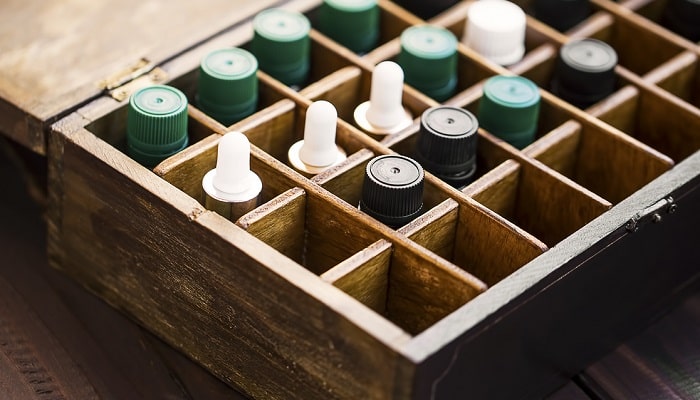Essential oils are concentrated extracts of plants such as flowers, leaves, or roots. The fact that it can take a large quantity of plants to produce a small bottle makes essential oils highly potent. But while this potency has many potential benefits, it can also lead to some concerns about safety. One of these concerns is whether essential oils can catch on fire and how flammable they actually are.
The flammable properties of essential oils
The properties of essential oils can indeed cause them to combust in certain conditions. In fact, many common oils are classified as Class 3 Flammable liquids. This category of liquids has a flash point between 100- and 140-degrees Fahrenheit (37.8 and 60 degrees Celsius).1
When the temperature of a Class 3 Flammable liquid increases to 100 degrees or more, it emits vapors that can ignite from a nearby source. Ignition sources are present in many types of environments. The sources that pose the highest risk for essential oils are naked flames and hot surfaces such as stovetops.2
It’s important to note that a flash point is different than an auto-ignition point. In contrast, an auto-ignition point is the temperature at which a substance can spontaneously combust without an ignition source. This point is typically higher than a flash point.
Which essential oils are flammable?
Although nearly all essential oils are flammable, some are more likely to combust than others. The most flammable essential oils include:
- Eucalyptus
- Frankincense
- Grapefruit
- Juniper Berry
- Lemon
- Nutmeg
- Orange
- Rosemary
- Cypress
- Pine3
On the other end of the spectrum, oils that are not as flammable include cedarwood, basil, myrrh, clove, lemongrass, vetiver, patchouli, and ylang ylang.
While some are more flammable than others, it’s wise to treat all essential oils as flammable substances.
How to avoid fires from essential oils

Because essential oils can be a potential fire hazard, it’s important to take precautions to avoid causing serious damage in your home or workplace. Make sure to follow the safety guidelines below to protect yourself and those around you:
- Keep oils away from naked flames and hot surfaces
- Only store essential oils in dark glass bottles
- Close essential oil bottles tightly and only use airtight caps
- Keep essential oils out of direct sunlight
Additionally, precautions should be taken when disposing of an essential oil as well. To avoid a potential fire hazard, let the oil diffuse on a dish or simply add baking soda to it before throwing it in the garbage.
For more information about using essential oils safely, download this guide.
Are essential oils safe to use in the dryer?
A common question when a person hears that essential oils are flammable is “Are they safe to use in a dryer?” While it’s true that many people use essential oils in the dryer to freshen up their clothes without any issues, a dryer’s temperature is higher than the flashpoint of many essential oils. Therefore, it is recommended to avoid using essential oils in the dryer.
Towels that have absorbed essential oils are also a potential fire hazard, even after they’ve been washed. The UK’s Technical Fire Safety Department found that fires have occurred when towels and linens with absorbed essential oils were washed at lower temperatures and then put into the dryer. They note that at lower temperatures, the oil doesn’t break down in the washer so it’s still flammable.4
To avoid these types of fires, washing towels and linens with absorbed essential oils in water that’s at least 104 degrees Fahrenheit (40 degrees Celsius) is advised. This also goes for towels that have absorbed carrier oils, whether they have been mixed with essential oils or not.
Are diffused essential oils flammable?

Another common question is whether diffused essential oils are flammable as well. According to essential oil expert Robert Tisserand, diffused essential oils in the air do not create a fire hazard.5 Of course, this is a different story if you are using a burner with an open flame to diffuse essential oils. However, burning essential oils in this way generally isn’t advised as it may change the composition of the oil in addition to creating a fire hazard.
Is it safe to cook with essential oils?
There is much debate about whether ingesting essential oils is safe from a health perspective. Some argue that even food-grade essential oils are too potent and can upset the digestive system, while others say that these oils are completely safe to consume.
But if you do decide to cook with essential oils on the stovetop or in the oven, you should exercise caution as they can have the potential to ignite and cause a fire. As such, you should always dilute an essential oil in a food-grade carrier oil before adding it to your food (or having it near a heated stove). This will not only be easier on your digestive system, but will disperse the oil so it’s not as flammable as well. Additionally, you should only use a drop or two of an essential oil in your recipes.
Keep essential oils away from heat
Essential oils offer a variety of potential health benefits and are generally safe to use. However, certain precautions should be taken when using, storing, and disposing of essential oils as they do have the potential to catch fire in certain situations.
The bottom line is that you should keep essential oils away from heat sources such as open flames and heated surfaces. Additionally, make sure that any towels or linens that have absorbed essential oils are washed in hot water before putting them in the dryer, and ensure that any essential oils you are throwing away are dissolved before discarding them.
 About Seth Morris
About Seth Morris
Seth Morris is an experienced article writer with a background in marketing, Web content creation, and health research. In addition to writing and editing content for the ZYTO website and blog, he has written hundreds of articles for various websites on topics such as holistic wellness, health technology, and Internet marketing. Seth has earned Bachelor’s Degrees in Business Management as well as Literary Studies.
Sources:
1. DeVroom, Dawn. “Hazardous Waste Class III: Flammable Liquids.” IDR Environmental Services. Blog.idrenvironmental.com.
2. “Flammable Liquids: Difference Between Flash Point and Auto-Ignition Temperature.” STOREMASTA. Blog.storemasta.com.au.
3. “Essential Oil Flash Points.” Serenis. Candles.org.uk.
4. “An Interesting Caution about EOs and Laundry.” The Untamed Alchemist. Theuntamedalchemist.com.
5. Tisserand, Robert. “Q&A: Are vaporized essential oils a fire hazard?” Robert Tisserand. Robertisserand.com.